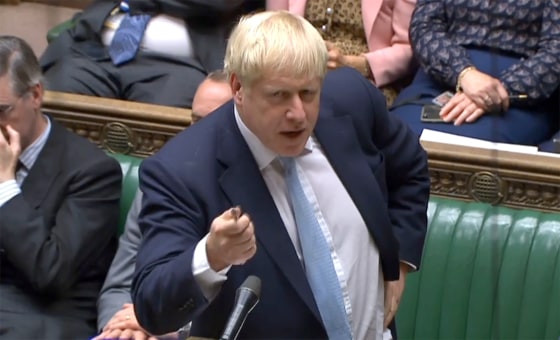LONDON — Boris Johnson's last ditch-proposals to solve the Brexit deadlock have been rejected by key European Union leaders, as time to agree an amicable divorce continues to run out.
Addressing the House of Commons on Thursday in far more measured terms that he has used in recent weeks, Johnson outlined a new approach to Northern Ireland — part of the U.K. but integrated with the Irish Republic, an E.U. member.
"If our European neighbors choose to show a corresponding willingness to reach a deal, then we shall have to leave on Oct. 31 without an agreement and we are ready to do so," Johnson said, a day after his government submitted its proposal to the E.U. "But that outcome would be a failure of statecraft for which all parties would be held responsible."
But the European Parliament's Brexit coordinator, Guy Verhofstadt, did not sound convinced, saying it would be "nearly impossible" for the E.U. to agree to Johnson's plan.
The European Parliament's Brexit Steering Group went further and said, "the proposals do not match even remotely what was agreed as a sufficient compromise in the backstop."
Irish Prime Minister Leo Varadkar accused Johnson of contradicting papers submitted by the U.K. government on Wednesday, adding that opinion polls have skewed towards remaining in the E.U. since Johnson became prime minister.
The Irish Republic's foreign minister, Simon Coveney, went further and said the proposal was not consistent with the Good Friday Agreement.
The complex plan released Thursday would see Northern Ireland remain in the E.U. single market for goods — a shared set of trading and economic rules all 28 member states follow — but follow U.K. customs rules.
A customs border could threaten the current frictionless border between the Republic and Northern Ireland. Politicians in Dublin, Belfast and Brussels fear this could jeopardize the 1998 Good Friday peace treaty that brought an end to the sectarian conflict known as "the Troubles."
Johnson argued that any customs checks could happen electronically or away from the actual border. He said protecting the peace process was the "highest priority of all."
Johnson's tone marked a change from recent blustery and strident comments from the prime minister, who has in the past pledged to take the country out of the E.U. by Oct. 31 "do or die."
Parliament rejected multiple deals that Theresa May, Johnson's predecessor, negotiated with the E.U.
Economists have warned that leaving without a deal would have dire consequences for the U.K. and Irish economies — but some English Euroskeptics, including some in Johnson's cabinet, favor this approach.
And the prime minister's critics accuse him of acting in bad faith and submitting a plan designed to be rejected by the E.U. so he has a greater chance of leaving by the October deadline.
Opposition Labour leader Jeremy Corbyn accused Johnson of tabling a deal he knows won't be passed by British lawmakers or European leaders. He said Johnson wanted "a Trump-deal Brexit that would crash our economy and rip away the standards that put a floor on people's rights at work."
Euroskeptics including Johnson argue the backstop is undemocratic because it could keep the U.K. in an E.U. customs union indefinitely.


